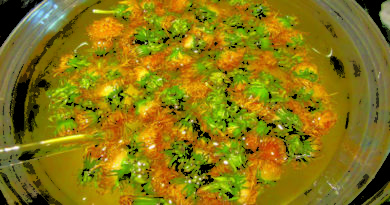Top teas for winter wellness
By Rebecca Mullins, RHN
One of the easiest and most delightful ways to equip your immune system is by drinking herbal teas. Herbal teas are made from fresh or dried flowers, leaves, seeds or roots of herbs.
There is something mystically refreshing about a just-steeped cup of herbal tea. Through our ability today to blend for flavour using ingredients gathered from around the world, the ancient custom of pouring boiling water over herbs to activate their health-giving ingredients has never been more enjoyable.
Loose leaf vs. tea bags
Loose leaf teas are consistently higher-grade, making them higher in antioxidants, minerals and vitamins than tea bags. The quality of flavour and aroma of loose leaf tea far surpasses that of tea bags. Similar to wine, which depends on regional growing conditions and climate, the taste of tea is greatly affected by where and how it is grown and processed and the quality of the water that is used to steep the leaves.
When preparing your tea, it is best to use filtered or distilled water. Allow the mixture to steep for several minutes, in order to obtain maximum flavour. Flavours of herbal teas are also improved with the addition of a touch of honey. Never use sugar.
Choose organic
Teas made from organic herbs (grown in conditions without the use of pesticides, chemical fertilizers, or genetically modified organisms) and grown in nutritionally rich soil provide you with the greatest amount of health benefits and superior flavour.
There are many wonderful varieties of effective herbal teas. The following are just a few of the most popular choices. There are various ways to prepare the teas, and you may also want to combine ingredients. Ask for more information at your local health store.
Echinacea
Echinacea is a traditional favourite for colds and flu. It stimulates the immune system and is helpful to the lymphatic system. It fights viral infection, reduces inflammation, and promotes healing, making it a key herb to use whenever the body is under attack. It has a distinctive, rather strong taste.
Goldenseal
This staple remedial root has proven very effective at treating infection and inflammation of the mucus membranes lining the upper respiratory tract. It has powerful antibiotic properties. When combined with echinacea, goldenseal effectively shortens the duration of colds and the flu. It has a bitter taste, and is best sweetened with honey.
Ginseng
The Asian variety of ginseng has immune-enhancing properties that prevent infection with influenza. It is prized as an adaptogen – a product that increases a body’s resistance to stress while doing no harm. It also reduces inflammation from ailments such as sore throats. It tastes a little bit like green tea, but has a milder flavour.
Elderberry
Elderberry contains two compounds that are active against flu viruses. It also prevents a virus from invading respiratory tract cells, and relieves bronchitis, asthma, sore throat and colds. It is an excellent internal cleanser, and has anti-inflammatory, diuretic, and immuno-stimulant properties. It has a very mellow, dried fruit kind of flavor.
Mullein
Mullein, also known as flannel flower and velvet plant for its soft, velvety feel, is an herb that has long been used to treat all kinds of ailments, including many breathing and lung problems. It contains compounds that inhibit flu viruses. A tea made with mullein flowers or leaves provide throat-soothing mucilage and also have an expectorant effect. It has a honey-like fragrance and an almond-like taste.
Astragalus
Astragalus root has been used to enhance the immune system and strengthen the body’s resistance to disease for thousands of years in China. It can stimulate practically all of the processes of your immune system, and also increases the number of stem cells in bone marrow and speeds their growth into active immune cells.
Astragalus also boosts levels of interferon, one of your body’s potent fighters against viruses, which can help prevent or shorten the duration of colds and flu. It boosts the production of white blood cells called macrophages, whose function is to destroy invading viruses and bacteria. It has a very mild taste.
Linden Flower
At the onset of flu, linden flower tea with two drops of lemon balm oil is very effective. When you start to sweat, quickly go to bed and continue sweating for one hour. Change clothes, rub body dry and try to sleep. This therapy often stops the flu before it becomes full-blown. It was known in ancient times as the ‘nectar of the kings’ because of its sweet taste.
So this winter, stay healthy and nestle under your down blanket by the crackling fireplace with your steaming cup of herbal tea.
Rebecca Mullins is a B.C.-based registered holistic nutritionist.




